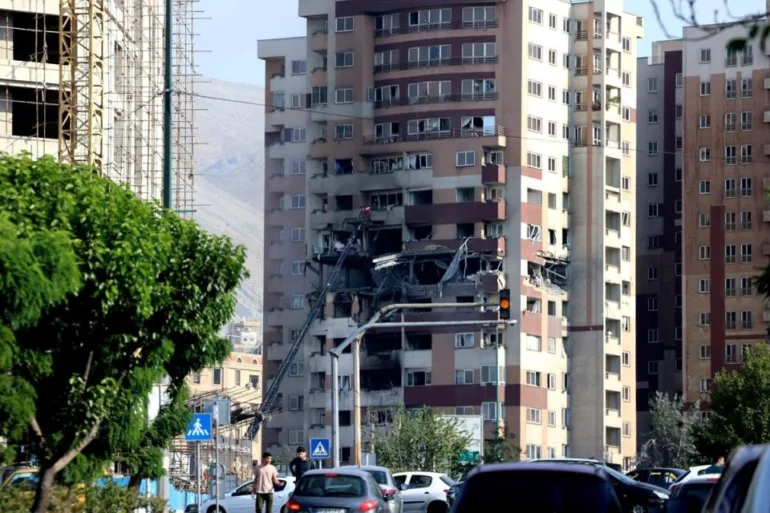Israel launched a massive wave of airstrikes on Iran Friday, targeting approximately 100 sites, including nuclear facilities and military command centers. Among those killed were senior Iranian figures, including the armed forces chief of staff and prominent nuclear scientists.
In response, Iran’s Supreme Leader Ayatollah Ali Khamenei warned Israel would face a “bitter and painful” fate. Iran’s military vowed there would be “no limits” to its response.
The Israeli military later reported that Iran retaliated by launching around 100 drones, which were intercepted before reaching Israeli airspace. Neighboring Jordan confirmed that it had intercepted drones and missiles that had violated its airspace, prompting air raid sirens in Amman.
Former U.S. President Donald Trump told Fox News he had advance knowledge of the Israeli strikes — which involved 200 fighter jets — and reiterated that Tehran must never acquire a nuclear weapon.
The U.S. government emphasized it was not involved in the operation and warned Iran against attacking American personnel or assets. However, Iranian officials insisted Washington bears responsibility, claiming the Israeli operation could not have occurred without U.S. coordination or approval.
Israeli Prime Minister Benjamin Netanyahu said the strikes targeted the “heart of Iran’s nuclear enrichment program,” including the Natanz facility and senior scientists. He warned that the campaign would continue “as many days as it takes.”
Israeli intelligence, according to military officials, indicated Iran was nearing the “point of no return” in its nuclear ambitions.
Iranian state media confirmed the deaths of Armed Forces Chief of Staff Mohammad Bagheri and Islamic Revolutionary Guard Corps (IRGC) commander Hossein Salami. Six nuclear scientists were also reported killed. AFP images showed a gaping hole in the side of a Tehran high-rise, apparently from a precision strike. State media said civilians, including women and children, were among the casualties.
Israeli Defence Minister Israel Katz stated: “The precise targeting of senior commanders and nuclear scientists — all involved in Iran’s plan to destroy Israel — sends a clear message: those working for Israel’s destruction will be eliminated.”
Region on edge
Tehran streets emptied, with long lines forming at petrol stations — a familiar scene in times of crisis. Flights were suspended at Imam Khomeini International Airport. Iraq and Jordan also closed their airspace, while several Gulf airlines canceled flights to and from Iran, Iraq, Jordan, Lebanon, and Syria.
Israel declared a state of emergency and closed its own airspace, bracing for further retaliation.
Jordan’s military confirmed its air defences had intercepted missiles and drones entering its territory. Iran’s armed forces warned that Israel had “crossed all red lines,” promising an unlimited response.
The strikes rattled global markets: oil prices surged while stock indexes dipped. The escalation came shortly after Trump warned of the potential for a “massive conflict” in the region. He also announced a drawdown of U.S. personnel in the Middle East amid Iranian threats to target American bases if war breaks out.
Before the Israeli strikes, Trump had said a new nuclear deal with Iran was “fairly close,” but warned that an Israeli attack could derail those talks. “I don’t want them going in, because I think it would blow it,” he told Fox News. “Might help it actually, but it also could blow it.”
Uncertain diplomatic path
U.S. Secretary of State Marco Rubio reiterated that Washington was not involved in the Israeli strikes and warned Iran not to retaliate against American forces.
A sixth round of talks between the U.S. and Iran, scheduled for Sunday in Oman, is now in doubt. Still, Trump said the U.S. was “hoping to get back to the negotiating table.”
The UN’s International Atomic Energy Agency (IAEA) confirmed that Natanz was among the targeted sites and said it was “closely monitoring” the situation. “We are in contact with Iranian authorities regarding radiation levels and with our inspectors in the country,” said IAEA chief Rafael Grossi.
Long-simmering conflict boils over
Israel, which considers Iran an existential threat, has grown more assertive since the October 7, 2023, Hamas attack, which it says was backed by Tehran. In the months since, Israel and Iran have exchanged direct attacks for the first time, and Israeli forces have been engaged with Iranian proxies including Hezbollah in Lebanon and the Houthi rebels in Yemen.
The United States, Western powers, and Israel have long accused Iran of seeking to build a nuclear weapon — a charge Tehran has consistently denied.
Tensions escalated further this week after the IAEA accused Iran of non-compliance with nuclear obligations. Iran’s nuclear chief, Mohammad Eslami, called the resolution “extremist,” and Tehran announced plans to launch a new uranium enrichment center at an undisclosed secure location.
Iran is currently enriching uranium to 60 percent purity — well above the 3.67 percent limit set by the 2015 nuclear deal and nearing the 90 percent threshold required for weapons-grade material.
AFP


